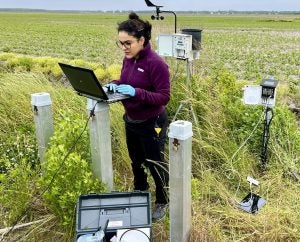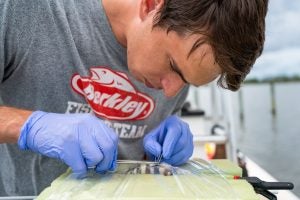Fall 2022 CCEDS NRT Cohort
Congratulations to the first round of trainees to enter the CCEDS NRT Program!
Learn more about the cohort and their respective research below.

Maria Gomez (Ph.D., Integrated Coastal Sciences)
Focusing on the intersection of ecosystem services and human health—otherwise known as Eco-Health my research seeks to understand the impact climate change has on physiological health outcomes. Despite our efforts as a society to isolate humans from the natural environment, humans are dependent on the flow of ecosystem services. These services are traditionally classified among provisioning, regulatory, cultural, and supporting services and include everything from timber for construction to air regulation to water quality. These ecosystem services showcase humans’ dependence on the environment and why we should protect and manage it. By concentrating on developing tropical countries, I seek to understand further humans’ relationships with ecosystem services in coastal ecosystems where mangroves, corals, and marsh interact with local communities and their corresponding physiological health. My approach combines remote sensing and spatial econometrics methods to integrate environmental and health data to measure ecosystem and human health changes. Hence, causal inferences and the economic quantification of the ecosystem’s services are performed using the output relationships from the weighted matrix.
Megan Geesin (Ph.D., Integrated Coastal Sciences)
I study the ecological and geomorphological changes in and around oyster breakwaters to determine the optimal environmental conditions for maximum ecological diversity and erosion prevention. To do this, I collect data on the faunal community in and around oyster breakwaters, I conduct salt marsh and seagrass surveys, and I derive erosion/accretion rates and marsh migration rates from drone imagery collected at our sites.


Elnaz Pezeshki (Ph.D., Integrated Coastal Sciences)
In October 2019 I joined the integrated coastal sciences program at East Carolina University as a Ph.D. student. I research the impact of climate change on coupled impacts between groundwater and surface water with specific relevance to agriculture. I also research the resilience on soil and water resources, specifically groundwater and runoff response impacts at the watershed scale in the coastal area. I collect data from coastal farms that are impacted by saltwater intrusion. My research uses field measured data, historical measured data, hydrological data-driven modeling, and geophysical techniques to address the coastal watershed salinization problem which is a very critical ongoing problem in Eastern North Carolina.
Andrew McMains (Ph.D., Interdisciplinary Doctoral Program in Biology, Biomedicine, & Chemistry)
My research focuses on exploring the impacts of anthropogenic changes to habitats on fish behavior. I utilize acoustic techniques ranging from telemetry arrays to splitbeam and multibeam sonars and conduct my research in the estuarine and coastal waters of North Carolina. I am a 3rd year PhD student under Dr. Jim Morley in the Interdisciplinary Doctoral Program in Biology, Biomedicine and Chemistry with a focus in Biology.


Naomi Jainarine (Ph.D., Interdisciplinary Doctoral Program in Biology, Biomedicine, & Chemistry)
I currently study how environmental variables associated with climate change and other anthropogenic influences impact the phenology, abundance, and diversity of zooplankton and ichthyoplankton (larval fish). I am interested in how the timing of zooplankton blooms and the ingress of larval fish overlap with each other, how dredging impacts zooplankton assemblages, and what factors can be used to predict shifts in both zooplankton and ichthyoplankton abundance. Identifying zooplankton with a traditional microscope limits the number of samples that can be processed. Because of this, we rely on ZooScan technology to scan samples and machine learning to identify the samples. Later stages of this research will also rely on modeling techniques to predict the timing of biological events and plankton abundance. This research will allow us to gauge the survival of larval fish into the juvenile stage and assess different modes of productivity in a given environment. The overlap between ecology, statistical techniques, model development, and machine learning is what led me to the NRT program. With the NRT Program, I hope to apply my biological data to both modern and traditional analysis techniques in data science.
Mahesh Tapas (Ph.D., Integrated Coastal Sciences)
Mahesh Tapas investigates how interactive effects among SLR, climate change, anthropogenic activities and farmers’ land use-land management decisions affect costal agricultural watershed’s ecosystem health. He will assess the watershed impacts using the socio-hydrological model developed using SWAT+. His work involves processing a huge amount of data with multiple simulations using parallel processing for calibrating and validating the model with R language. These predictions will be helpful for policymakers to form better adaptation and resilience strategies.
